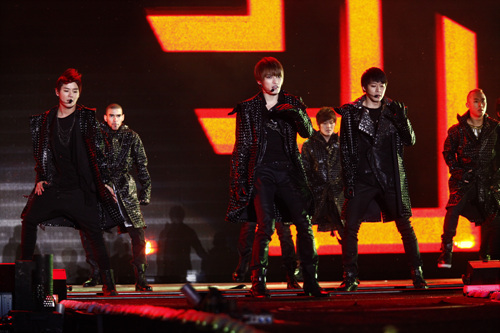This is giving us real insight into the costs of producing these tours. Since we now know that investors are involved, there is more understanding of money sources available, but less understanding of why the artists have to carry so many costs personally. Interesting profession. Perhaps they can also invest, but I doubt that was the case with SM. Momma Cha BTW, 60 million baht ( Thailand currency) is equal to $1, 765, 225.00 U.S.dollars.
[Trans] Summary of Radio Interview With Thai’s JYJ World Tour Organizer

- JYJ World Tour in Thailand was first set the budget at 50 million Baht. Now the budget is increased to 60 million.
- Thailand will be the first location in their world tour and will always be. It’s their norm. They say they love Thailand.
- Because Thailand will be the first stop, the format of the whole world tour will be done here. That’s why JJ’s flying here personally to take care of the production details.
- The Thai organizer also asked them to have Thailand to be their first stop in their world tour since they’ve contacted them last year.
- Yesterday JJ went to the venue, Impact Arena to feel the presence of the arena, like where will be the stage? Where will the fans be? The height of the stage?
- JJ concerns a lot about his fans and audiences.
- The stage is not set yet (Currently, the arena floor is covered with ice from Disney on Ice show, and it’s in the process of melting the ice). Though the stage is not yet set, JJ still went to the venue.
- After see the venue, he asked for additional equipments and concert supplies, like jumping machine, fireworks, and increase the stage height.
- The stage will have projector underneath it and JJ asked to make the stage higher which add more cost (XD)
- The jumping machine have to be imported which caused 1 million Baht. (There’s no such jumping machine in Thailand, we only have a normal stage lift.)
- The stage firework also have to be imported because we also don’t have that type of firework here. (I’m not sure how it’s special because the DJ has interrupted, but what I caught is that it might be more safe.) And yes.. add more costs 555
- Total concert time will be around two hours.
- One of the DJ asked whether JYJ fees are higher than 10 million. Mr. Kung, the organizer answers… it’s wayyy higher than that.
- The organizer is now negotiating for higher numbers of fans in fan meeting, might be around 300 fans (used to be 250).
- The organizer decided to hold JYJ concert because JYJ are highly demanded, having large fanbase, and extremely popular.
- The social networks help the organizer to keep in touch with fans and fast feedback. They will do their best.
Note: There are 2 DJ. One of them is a good friend with the organizer, actually he’s also one of the investor, that why he kept asking about the costs.
Another DJ knows extremely well about Korean artist fan club culture. He seems to know a lot about JYJ.
summary by: 3rebelangels
shared by: sharingyoochun.net
Our source: sharingyoochun.net
Share this
